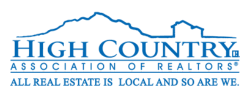Filing an Ethics Complaint
REALTORS® are different from non-member licensees in that they voluntarily subscribe to a strict Code of Ethics. If you believe that a REALTOR® affiliated with the High Country Association of REALTORS® has violated one or more Articles of the Code of Ethics, you can file an ethics complaint alleging a violation(s) by submitting the form below.
Before filing a complaint, please review this brochure provided by the National Association of REALTORS®, which offers information about the process.
Consumer Facts
(1) Persons who wish to file complaints against real estate brokers (including those associated with time share projects) should file a "Complaint Form" online. The Commission has the authority to discipline licensed brokers for violation of the Real Estate License Law and Commission rules. The Commission does not have the authority to award monetary compensation
(1) Complaints are reviewed by the Commission’s Regulatory Affairs staff and, if appropriate, an investigation or other inquiry is conducted.
(2) If, following an investigation or other inquiry, it is determined that there appears to be sufficient proof ("probable cause") that the broker has violated the Real Estate License Law or Commission’s rules, a hearing is ordered. [Note: The Commission’s hearings are conducted in accordance with the Administrative Procedures Act, NCGS Chapter 150B.] During the hearing, the Commission receives the sworn testimony of witnesses and gives the broker the opportunity to answer the charges and present evidence in their defense. The broker may be represented by an attorney.
(3) If, based upon the evidence, the Commission finds that the broker has violated the Real Estate License Law or Commission rules, it can either (a) reprimand the broker; (b) suspend the broker’s real estate license for a definite period of time; (c) revoke the broker’s license; or (d) in the case of time share transactions, fine the time share project’s developer. [Note: Decisions of the Commission may be appealed by brokers through the court system.]
No. Consumers should contact the North Carolina State Bar (for attorneys), the North Carolina Appraisal Board (for real estate appraisers), the North Carolina Home Inspector Licensure Board (for home inspectors), the North Carolina Office of Commissioner of Banks (for banks, mortgage companies or mortgage brokers), or other appropriate agencies.
Not unless the landlord is licensed as a real estate broker. A tenant who is renting a residential property directly from an unlicensed landlord (rather than from a real estate broker) may contact the Consumer Protection Section of the North Carolina Department of Justice . Click the following links for detailed information about Renting Residential Real Estate, Tenant Security Deposits, and NC Military Personnel Residential Lease Termination.
No. The Commission cannot enforce contracts or require real estate brokers to fulfill promises, reimburse money, or perform other acts. Persons who feel that money is owed to them in a real estate transaction or that a sales contract, lease, etc. has been breached should consult their private attorney for advice and assistance.
Earnest money is given by the buyer to the seller to demonstrate the buyer’s good faith when making an offer to purchase the seller’s property. Read the Commission’s, Questions and Answers on: Earnest Money Deposits for more detailed information. A due diligence fee is a separate negotiated amount of money paid by the buyer to the seller in exchange for the buyer’s right to terminate the contract for any reason (or no reason) during the "due diligence period", as agreed between the buyer and seller in the purchase contract. Read the Commission’s, Questions and Answers on: Due Diligence for Residential Buyers for more detailed information on the due diligence process.
When a broker has been entrusted to hold the funds of others as part of a real estate sales or rental transaction, the broker must deposit the money in a trust or escrow account in a federally insured depository institution. Some funds, like due diligence fees in residential sales transactions, are typically delivered to the seller immediately, in accordance with the terms of the contract, and are not held in a trust or escrow account.
Fair Housing laws prohibit Brokers from answering certain neighborhood characteristic questions. See Questions & Answers on Fair Housing.
The disclosure explains the various types of working relationships that real estate brokers may have with clients and customers in real estate transactions in NC. The Disclosure is published by the NC Real Estate Commission; North Carolina brokers are required by law to review it with prospective clients and customers at "first substantial contact".
Click here to view the Disclosure.
For more detailed information about the various types of working relationships that may be available to you when working with a broker, Click here to view Questions and Answers on: Working with Real Estate Agents. This brochure may help you decide the legal relationship you want to have with a real estate broker. It will also give you useful information about the various services real estate brokers can provide buyers and sellers, and it will help explain how they are paid.
Click here to read Commission Rule 58A.0104-Agency Agreements and Disclosure .
Yes, per GS 93A-1 , no one may accept compensation for brokerage activities in North Carolina without a North Carolina real estate license on Active status.
Persons who give down payments, earnest money deposits and other trust monies to licensed real estate brokers to be held pending the completion of real estate transactions, and whose funds are converted or embezzled by the broker, may, under certain specific conditions, receive compensation from a Real Estate Recovery Fund which is maintained by the Commission. (For information concerning the procedures and requirements for receiving payment from the Recovery Fund, interested persons should contact the Real Estate Commission’s Regulatory Affairs Division.)
